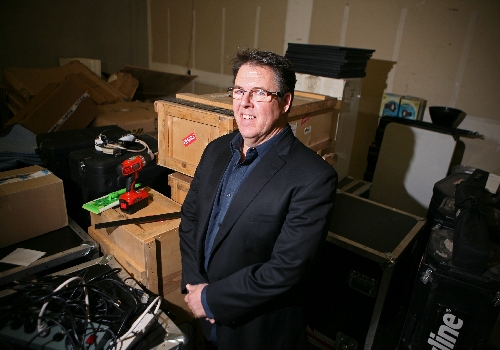Nevadan at Work: Making music more than playing instruments
Brad Lunde wouldn't give up on the music industry when the band broke up, but he turned in his bass guitar for the business world, and it's paid off.
The 57-year-old South Bend, Ind., native who grew up in Milwaukee is the owner of TransAudio Group, a Las Vegas-based wholesaler that supplies recording equipment to studios and retailers across the country and abroad. It does about $4 million a year in sales in an industry that features $8,000 microphones and $43,000 speakers.
Lunde dreamed of becoming a professional musician and his jazz-fusion band in the mid-1970s even got to back up Ted Nugent. Making a living as a musician, however, proved to be difficult, and he learned a lesson from his guitar teacher that he would come to accept.
"He said there are a million musicians better than himself that are still playing in their basement, so the chances of you being successful at this commercially are not very good," Lunde said. "I would suggest that if you think you are going to make a living at this that you find another line of work."
Lunde went to work in a high-end hi-fi store to support himself when the band broke up, and he gave up his dream of becoming a musician.
"That stimulated me to go work in the business end of it," Lunde said. "I was frustrated because I couldn't make a living as a professional musician."
But the experience, including working as a store manager, led him to work as a manufacturer's rep in the audio business and later as a national sales manager for manufacturers JBL and international sales manager for Aphex.
A stint as a consultant for an English manufacturer led to launching with his wife, Janis, a pro audio distribution company in 1997 in California. They moved to Las Vegas in 2000 and in 2005 formed a division in called Las Vegas Pro Audio to direct sell the high-end brands to performers.
Question: Who are your customers?
Answer: We sell to all the big retailers in the U.S. such as Guitar Center and Sweetwater. We also sell to a lot of little businesses that aren't well known but are important.
Question: What do you sell?
Answer: Microphones, studio monitors, mic preamplifiers, equalizers and compressors. These are all devices that are used in the process of recording or mixing or the final process that is called mastering. These are the people with the final say on how a record will sound.
Question: Who would use this?
Answer: Somebody who is a professional musician would do it. They might have a studio in their basement. A lot of these people do have studios in their homes. I sold Tom Petty his monitors for his house so he can listen to the work that is being done for him by his guys. I sold microphones to Janet Jackson to make her record and Phil Collins and Tom Petty and Martina McBride. Steve Perry from Journey called me about some speakers. We have a lot of people in Nashville. We do a lot of big studios across the country, especially in L.A.
Questions: So you have dealings with these artists?
Answer: Those people want to talk directly to the factory. They want to talk with the guy who really knows, even though I'm not the guy who's writing them the invoice. They want to talk to me about what they should do and how they should do it, and what's the best solution to their problem. You have to be deeply engaged with the customers to know what to sell. Then, you have to be in deeply enough with manufacturers to know who's building things that people really want. You also have to know enough of what people think of the mic to know when a change is warranted.
Question: How is that for you?
Answer: It is pretty satisfying when people call you up and ask you for your advice. Because as a kid I had my headphones listening to my first Beatles record and or Beach Boys record and wishing I could do that or meet those people and be there. I always wanted to be a rock star and here I am in a studio with these people.
I am not the rock star, but I get to contribute something to them in a way that they respect me for what they should do when it comes to this gear. It's a neat story.
Question: How much of what you distribute is domestic?
Answer: I would say it's about 60 percent domestic built versus imported. The best stuff in the world is built here in the U.S. The cool story about all this is that people who make records want the very best microphones and the very best gear.
Question: How does your model work?
Answer: You buy the gear from them. You own it and you resell it to the dealers. You are their only customers. I have an understanding of the business that not many people have. There aren't many people out there who have been an end user, a rep and a factory person. I could see how this animal operates, and it's easy for me to go talk to someone who invents microphones and say I know how to create it so you make money and sell it internationally and be successful in how we structure it.
Question: So you work with a lot of small-business owners in the U.S., England, Germany and other countries?
Answer: All of the very best stuff has always been created by these small owner-operators who are quite obscure and continue to be the lifeblood of the business. I continue to laugh at people when they say China is taking over the world. The people in China want the stuff that we have here in the worst way. They want these kinds of speakers and microphones. No one there knows how to make any of this stuff. They couldn't make this. A microphone for $10,000 - no one in China could come close to that. They will make the best $500 microphone ever and a terrific and fantastic $100 microphone.
They have an industry that's great at replicating and lowering costs. Their skill has not emerged at inventing and developing new product that no one has ever seen. That's what craftsmen do in America and Europe.
Question: How has the industry changed?
Answer: There used to be hundreds of independent stores all over the U.S., but it's now a handful of chain stores like Guitar Center. It was difficult for the independent dealers to stay competitive because they couldn't afford to stock a store full of stuff a musician wants to see.
Question: How has this affected you?
Answer: We have to do the marketing to get it to sell. Often to get the products going, I have to take it directly to the very top people in the business and get them using it and then they tell their friends and other people to drive user-end sales.
Question: Why did you come to Las Vegas?
Answer: We needed to grow, and we added more product lines. The cost of business is high in California, and her grandparents lived here and we came here often and liked it. It's less expensive to operate a business.
Question: Do you still play guitar?
Answer: Not anymore.
Question: Working as a musician wasn't as fun as it's made out to be when you were young?
Answer: You put a group of five or six people together who are very young, and their playing for different reasons. Some of the reasons were childish and some of them were not. Some of them are dreams of being a great musician. Some of them are "I want to get girls." Some are "I want to be rich." Some are "I want to be a star and have everybody love me." You put five or six people together and each one of those wants is covered there. You live with that person for close to two years in a close environment when you are practicing 20 or 30 hours a week. You are playing gigs and you are with these people more than you are with your family, and it can wear on you.
VITAL STATISTICS
Name: Brad Lunde.
Age: 57
Occupation: Owner, TransAudio Group.
Family: Wife, Janis; daughters, Julia, 15, Stephanie, 13.
Education: Studied business and music at University of Wisconsin-Milwaukee.
Work history: Played bass guitar in rock band; worked and later managed a hi-fi store; worked as manufacturers representative in audio business; worked in management for pro audio manufacturers.
Hobbies: Teaches a religion class at St. Anthony's.
Favorite book: Just read "The Next 100 Years: A Forecast for the 21st Century" by George Friedman.
Favorite movie: "Blade Runner." A science fan; reads a lot of science fiction books.
Favorite musical group: Steely Dan.
Favorite song: "Here and Now" by Luther Vandross.
Favorite bass player: Jack Bruce with Jefferson Airplane.
The band you would like to play bass for: Beach Boys.
Hometown: Born in South Bend, Ind.; grew up in Milwaukee.
In Las Vegas: Since 2000.
Quotable: "In business, if you worry about the money it seems you aren't worried about the customer."
TransAudio Group can be reached at 702-365-5155.

















